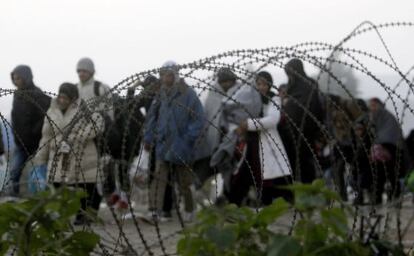More pressure on the EU
After the Paris attacks, the refugee crisis is moving towards its worst-case scenario

Just as German Chancellor Angela Merkel had warned, the lack of agreement in implementing a common asylum policy and a permanent refugee-sharing system has ended up affecting the Schengen area and the free circulation of people.
Even before the commotion caused by the Paris attacks, and reports concerning the possible infiltration of jihadists among the refugees, Sweden had already joined the list of countries shutting down their borders.
Even before Paris, the situation was already deplorable
First it was Germany and Austria, then Slovenia, after initially reacting to the flow of war refugees with open arms. Now, the latter has decided to build a fence along its border with Croatia. Meanwhile, Denmark, Norway and Finland have also toughened up their conditions for asylum.
And now, the Paris killings are making everything extraordinarily more complicated. The fact that a Syrian passport was found near the body of one of the suicide attackers has fueled fears expressed several weeks ago that some terrorists could use the refugee crisis to slip into the EU.
European interior ministers will address this issue on Friday, but there are already voices anticipating a new slowdown in Europe’s willingness to take in asylum-seekers. “I hope people will open their eyes now,” said the prime minister of Slovakia.
Meanwhile, the European representative of the new government in Poland warned that, following the events in France, “there are no political possibilities” of applying the existing agreements on refugee reallocation. Leaders in Bulgaria and other Eastern European countries have expressed similar views.
The failure in the way this crisis is being managed, together with the fact that the reallocation agreements are now being questioned, is resulting in an increasingly weak European Union, as feared.
In the absence of a collective response to the emergency, and with images of the Paris attacks still fresh in everyone’s minds, even the nations that have been most open to asylum-seekers, such as Sweden and Germany, are now stepping back.
The social-democratic government in Sweden has warned that it cannot keep up its current rate of refugee admission. Sweden is the country that has accepted the highest ratio of refugees in relation to its total population, while Germany has accepted the highest absolute number.
Berlin urgently needs help. European cohesion depends on whether Merkel – who is facing internal political division over the refugee crisis – is able to maintain her vision and exercise leadership at this crucial moment.
I hope people will open their eyes now”
Prime minister of Slovakia
European Commission President Jean-Claude Juncker has said, quite reasonably, that leaders should not cave in “to primary reactions.”
But even before Paris, the situation was already deplorable: nearly two months after agreeing to reallocate 160,000 refugees among the member states, barely 147 have reached their new homes. Meanwhile, the Commission is having trouble putting together the €3 billion it promised to Turkey to help it deal with the 2.2 million Syrians in its territory and prevent them from entering Europe.
The Malta summit last week was another failed occasion to get the refugee crisis back on track. Instead, it is moving towards the worst-case scenario: every nation for itself.
English version by Susana Urra.
Tu suscripción se está usando en otro dispositivo
¿Quieres añadir otro usuario a tu suscripción?
Si continúas leyendo en este dispositivo, no se podrá leer en el otro.
FlechaTu suscripción se está usando en otro dispositivo y solo puedes acceder a EL PAÍS desde un dispositivo a la vez.
Si quieres compartir tu cuenta, cambia tu suscripción a la modalidad Premium, así podrás añadir otro usuario. Cada uno accederá con su propia cuenta de email, lo que os permitirá personalizar vuestra experiencia en EL PAÍS.
¿Tienes una suscripción de empresa? Accede aquí para contratar más cuentas.
En el caso de no saber quién está usando tu cuenta, te recomendamos cambiar tu contraseña aquí.
Si decides continuar compartiendo tu cuenta, este mensaje se mostrará en tu dispositivo y en el de la otra persona que está usando tu cuenta de forma indefinida, afectando a tu experiencia de lectura. Puedes consultar aquí los términos y condiciones de la suscripción digital.








































